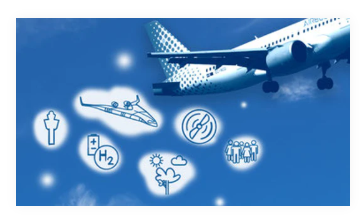Sustainable Aviation: The Route to Climate-Neutral Aviation free videos and free material uploaded by Delft University of Technology Staff .
Week 0: Welcome
In the Welcome section of this course we will explain how the course is set up, how the EdX platform works and we will give you an opportunity to introduce yourself and find out who else is following this course.
Week 1: Aviation and Climate Change
In the first week of the MOOC, we will kick things off by taking a birds-eye look at aviation and climate change.
How do aircraft impact the environment
Current situation
Week 2: How do Aircraft Fly?
To understand how we can decrease aviation’s impact on the environment, you will first learn exactly how an aircraft is able to fly.
The physics of flight: Lift and weight, thrust and drag
Aircraft performance
How to propel an aircraft
Week 3: Propulsion and Energy Carriers
In this week, we will take a more detailed look at the elements of a propulsion system and the energy sources that drive them.
Elements of propulsion systems
Engine efficiency
Aircraft energy carriers: options and limitations
Sustainable aviation fuels
Week 4: Production and End of Life
Of course, there is more to an aircraft than flying it. In week 4 of the MOOC, we will discuss the lifecycle of the aircraft.
Lifecycle Assessment
Production of aircraft
During lifetime
Aircraft end of life
Week 5: Novel Aircraft Design and Climate Effects
As we near the end of the MOOC, there are two topics we want to touch upon in more detail: firstly, concepts for the aircraft of the future, and secondly, the actual impact of aircraft on climate.
Novel aircraft designs
Aircraft emissions and their effect on the atmosphere
Aircraft noise
Week 6: Operations and Conclusion
Lastly, we will consider the airplane in society, and all the elements that surround it.
Airline planning
Air traffic management
Airport operations
How can you contribute?
Week 7: Conclusion and Final Assignment
Sustainable aviation is a key area for climate action. In this course, we will take you through the technologies and other innovations of recent years and promising future developments in the field.
We will start from the basics of how aircraft fly and how they impact the environment. You will gain present-day knowledge of technical solutions and possibilities of modern engineering to make aviation more sustainable.
Next, we will discuss solutions. you will learn about alternative propulsion methods, energy carriers (batteries, fuel cells) and novel aircraft designs (including the Flying V project at TU Delft, a new design for a highly energy-efficient and long-distance commercial aircraft.) We will also bust some common myths about the topics along the way, like why it is a very unpractical thought to simply cover up the entire aircraft with solar cells.
But the solutions presented will not cover just the technical aspects. You will discover the importance of the ecosystem surrounding aviation for its sustainability, including manufacturing and operations. The course will stimulate critical and creative thought about the future of aviation and how you can be part of those solutions.
With its long history of research of aircraft design, operations and climate effects, the world-class experts from the The Faculty of Aerospace Engineering at TU Delft will guide you through this journey to sustainable aviation. The course will also include guest lectures from industry professionals from leading aviation companies such as Airbus.
“We need climate-neutral aviation. The challenges are enormous, but solutions must and will be found. Through this MOOC we want to share what we know, so that all of you can be part of this ‘clean sky revolution’.” – Henri Werij, Dean Faculty of Aerospace Engineering at TU Delft

- 0 Reviews
- 1 Students
- 101 Courses

Write a public review